人教版九年级全册 Unit 12Life is full of the unexpected Section A(3a-4c)课件(共25张PPT)
文档属性
| 名称 | 人教版九年级全册 Unit 12Life is full of the unexpected Section A(3a-4c)课件(共25张PPT) | 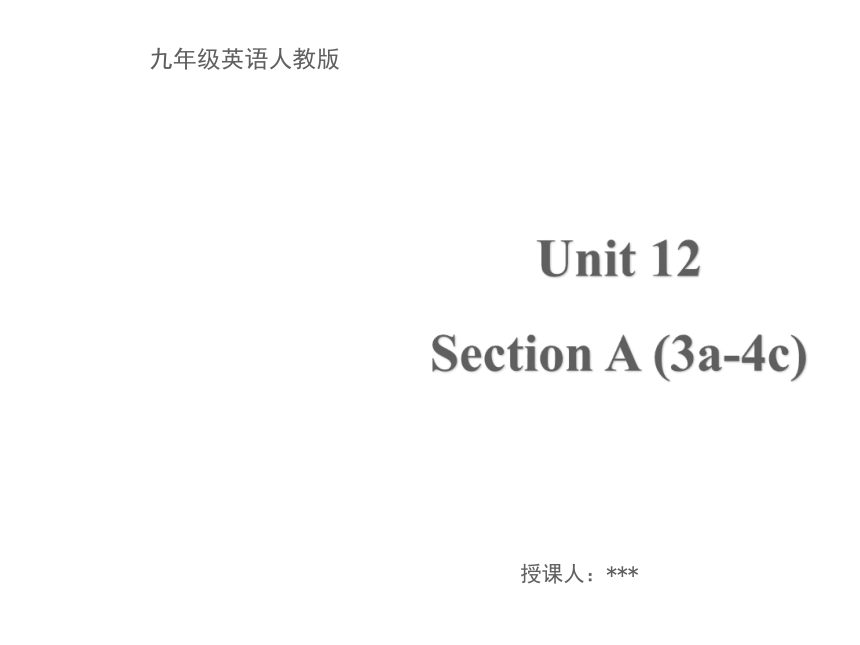 | |
| 格式 | pptx | ||
| 文件大小 | 1.3MB | ||
| 资源类型 | 教案 | ||
| 版本资源 | 人教新目标(Go for it)版 | ||
| 科目 | 英语 | ||
| 更新时间 | 2022-10-18 17:33:33 | ||
图片预览

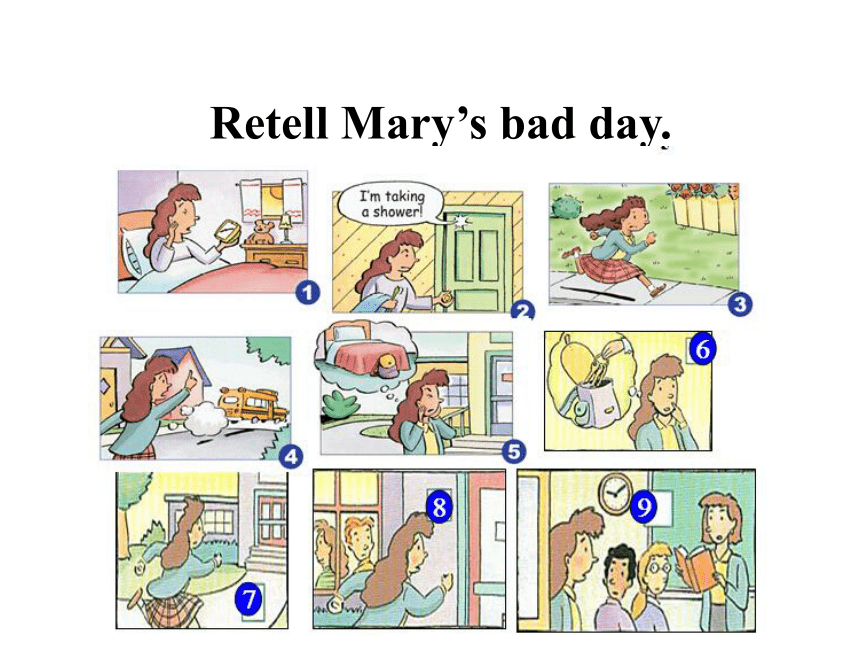
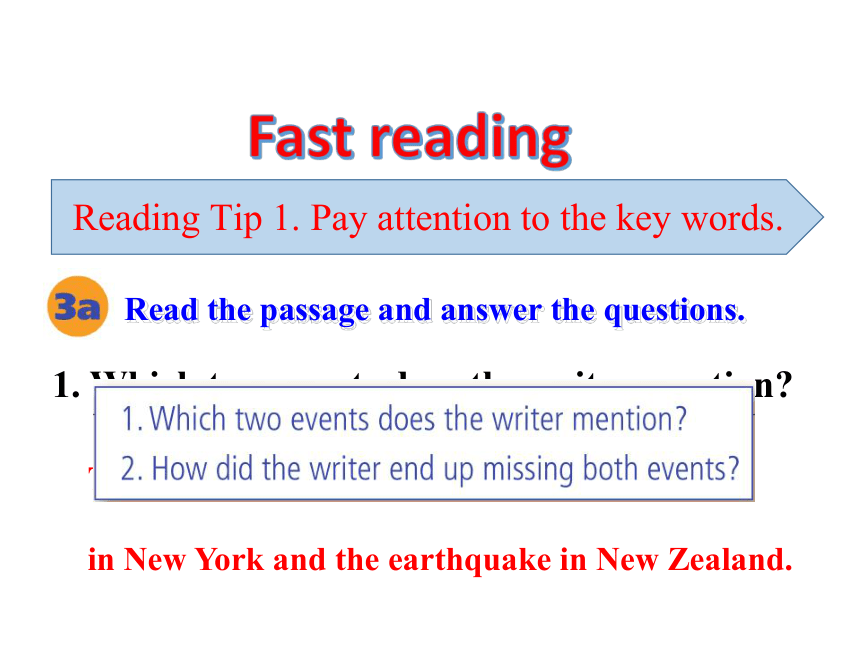
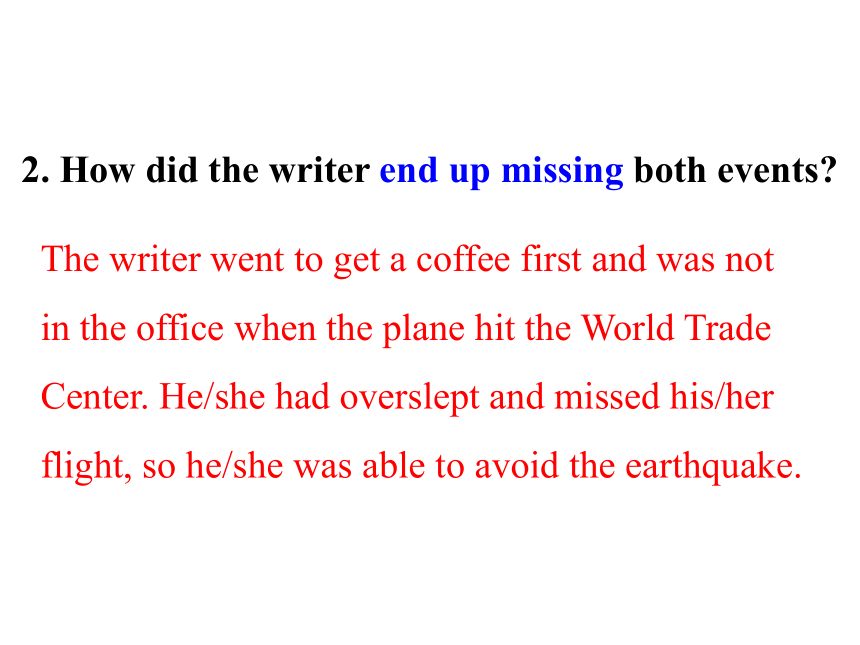
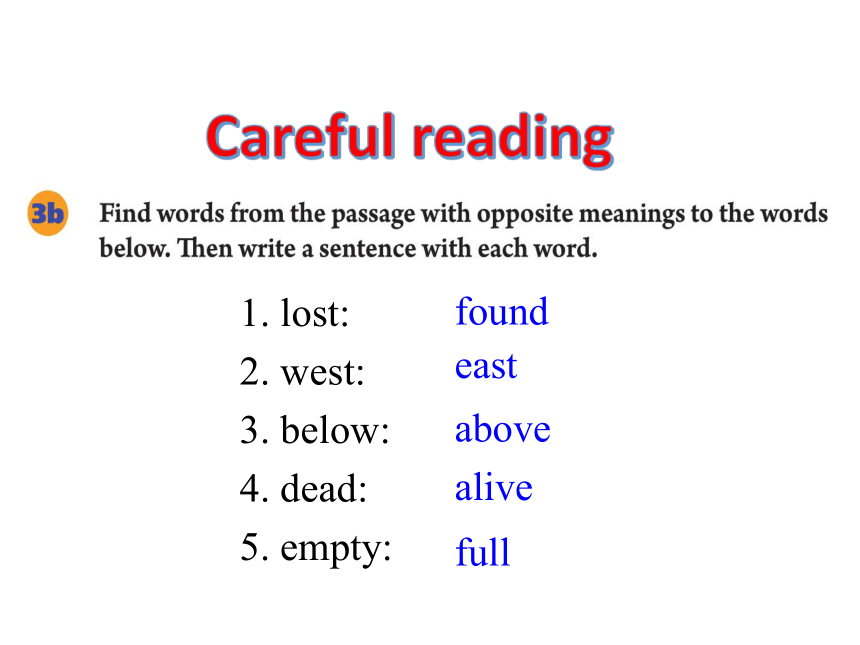
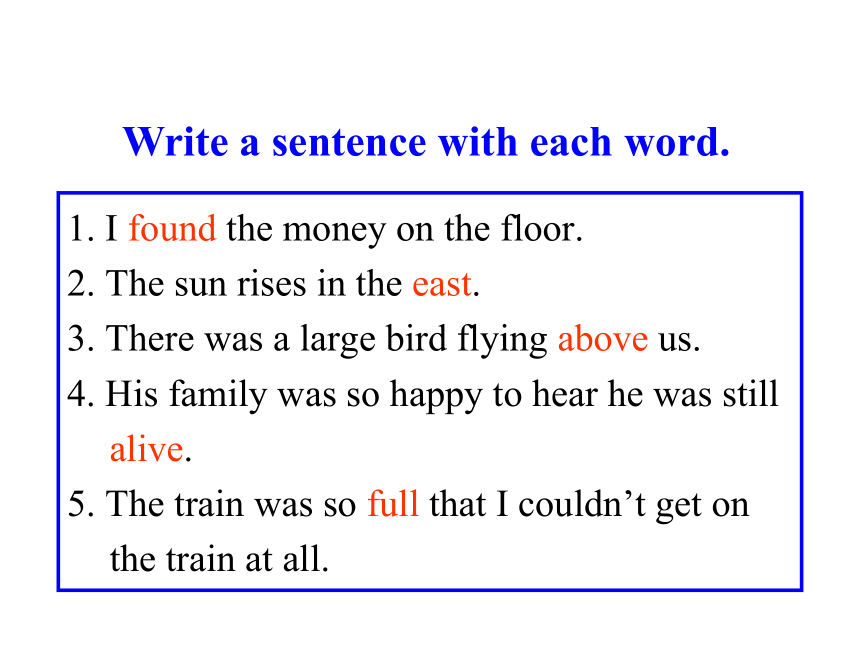
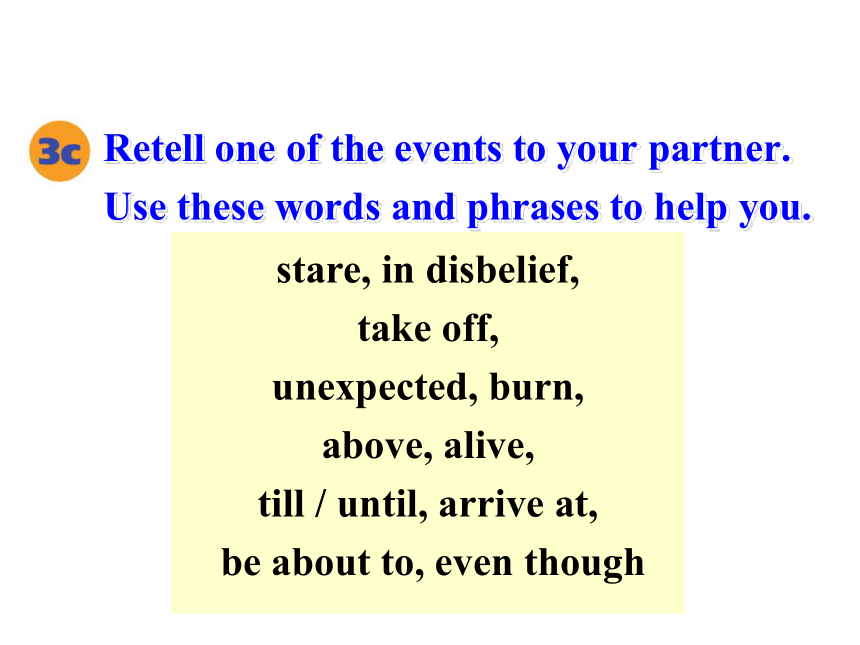
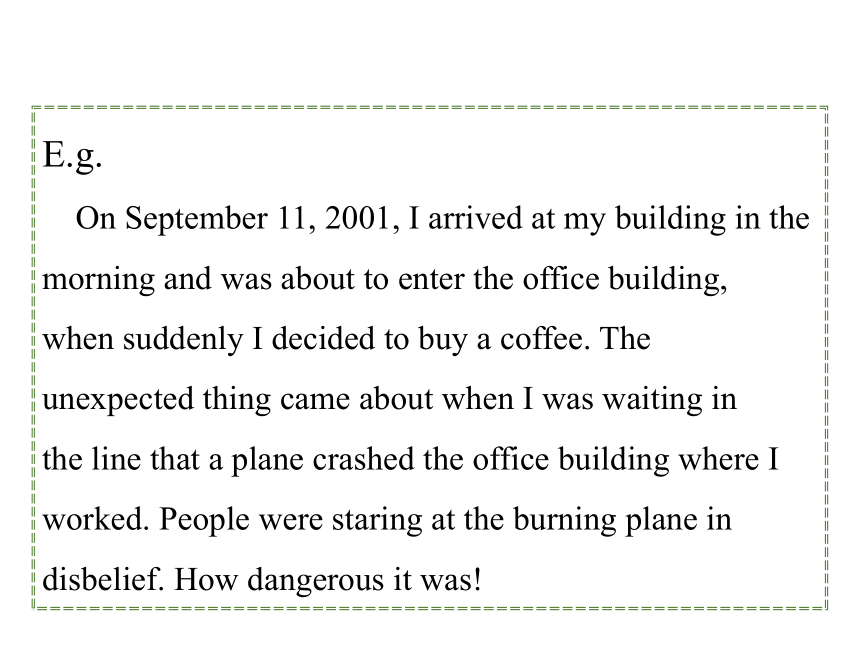
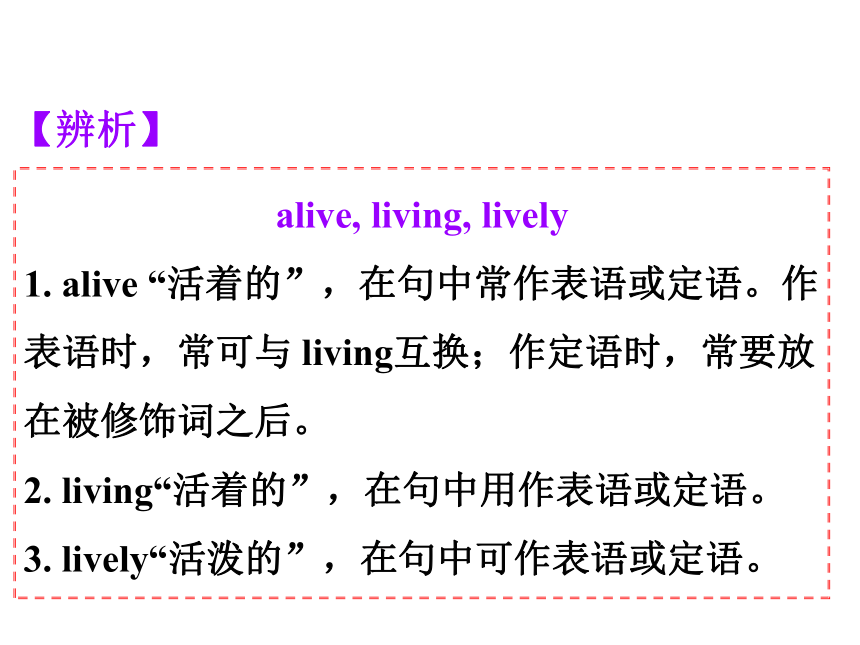
文档简介
(共25张PPT)
Unit 12
Section A (3a-4c)
九年级英语人教版
授课人:***
Retell Mary’s bad day.
Read the passage and answer the questions.
1. Which two events does the writer mention
Fast reading
Reading Tip 1. Pay attention to the key words.
The writer mentions the September 11 attack
in New York and the earthquake in New Zealand.
2. How did the writer end up missing both events
The writer went to get a coffee first and was not in the office when the plane hit the World Trade Center. He/she had overslept and missed his/her flight, so he/she was able to avoid the earthquake.
Careful reading
1. lost:
2. west:
3. below:
4. dead:
5. empty:
found
east
above
alive
full
1. I found the money on the floor.
2. The sun rises in the east.
3. There was a large bird flying above us.
4. His family was so happy to hear he was still alive.
5. The train was so full that I couldn’t get on the train at all.
Write a sentence with each word.
Retell one of the events to your partner. Use these words and phrases to help you.
stare, in disbelief,
take off,
unexpected, burn,
above, alive,
till / until, arrive at,
be about to, even though
E.g.
On September 11, 2001, I arrived at my building in the
morning and was about to enter the office building,
when suddenly I decided to buy a coffee. The
unexpected thing came about when I was waiting in
the line that a plane crashed the office building where I
worked. People were staring at the burning plane in
disbelief. How dangerous it was!
alive, living, lively
1. alive “活着的”,在句中常作表语或定语。作表语时,常可与 living互换;作定语时,常要放在被修饰词之后。
2. living“活着的”,在句中用作表语或定语。
3. lively“活泼的”,在句中可作表语或定语。
【辨析】
“忙于;即将做某事”,侧重于表示动作马上就要发生,常与when引导的从句连用,但不与具体的时间状语连用。
e.g. One of my friends is about to have her second baby.
我的一个朋友马上就要生第二个小孩了。
be about to do sth.
,
1. Tim went into the bathroom. Mary got up.
By the time Mary got up, Tim had already
gone into the bathroom.
2. The coffee became cold. I put cream (n. 奶
油) in the coffee.
__________________________________
__________________________________
Before I put cream in the coffee, the coffee had become cold.
3. The teacher collected the math homework. I got to school.
__________________________________
__________________________________
4. I completed the work for my boss. The workday (n. 工作日) ended.
__________________________________
__________________________________
By the time I got to school, the teacher had collected the math homework.
I had completed the work for my boss before the workday ended.
5. The movie started. I arrived at the cinema.
__________________________________
__________________________________
6. My mother finished making the apple pie.
I got home from my language course.
__________________________________
__________________________________
__________________________________
The movie had started before I arrived at the cinema.
By the time I got home from my language course, my mother had finished making the apple pie.
rush out
forget
arrive at
go into
show up
find out
of
to
rush out
forget
arrive at
go into
show up
find out
1.By the time I arrived at the party, everyone else______ already______.
2.When he put the noodles into a bowl, he realized he______ to add the green beans.
3.By the time my mother came back from the market, I______already ______of the door to go to my piano lesson.
4.Before she got to the airport, she ______about the earthquake.
5.When she______the movie theater, she remembered she had forgotten to feed her dog.
6.Before she got a chance to say goodbye, he______the building.
1. By the time I arrived at the party, everyone else _____ already __________.
2. When he put the noodles into a bowl, he realized he ____________ to add the green beans (n. 豆).
showed up
had
had forgotten
3. By the time my mother came back from the market (n. 市场), I ____ already __________
of the door to go to my piano lesson.
4. Before she got to the airport, she _________ ___ about the earthquake.
had
rushed out
had found
out
5. When she _________ the movie theater,
she remembered she had forgotten to feed
her dog.
6. Before she got a chance to say goodbye, he
________________ the building.
arrived at
had gone into
Write two true statements and one false statement about your day yesterday. Then ask your classmates to guess the false statement.
I had already had breakfast.
I had already had supper.
I had already had my hair cut.
I have got a present from Tom.
I had had these articles read.
I had finished my homework.
2. By the end of the school day,
__________________________________
________________________________ ____________________________________
1. By the time I left for school in the morning, ________________________________
__________________________________
__________________________________
3. By dinner time, I _________________________________
_________________________________
_________________________________
had had too many apples.
had eaten plenty of meat.
have had all the housework finished.
(1)定义 (2) 构成 (3) 标志
alive, living, lively
1. 我在动物园里见过活鳄鱼。
I have seen a _____ crocodile in the zoo.
2. 他是那场火灾中唯一活下来的人。
He is the only person ____ in the fire.
3. 露西是个活泼的孩子,大家都喜欢她。
Lucy is a _____ child and everyone likes her.
living
alive
lively
Complete the sentences.
1. When Tim got back home, he started to realize that the thief ___________ (come) to his house.
2. By the time I received the letter, I ____________ (tell) the content of it.
用括号里所给词的适当形式填空。
had come
had been told
1. 预习: Grammar Focus 中的内容。
Try to make sentences with before,
by the time and be doing … when,
and make use of the past perfect tense.
2. 写作: 描述一次难忘的经历。
本课结束
Unit 12
Section A (3a-4c)
九年级英语人教版
授课人:***
Retell Mary’s bad day.
Read the passage and answer the questions.
1. Which two events does the writer mention
Fast reading
Reading Tip 1. Pay attention to the key words.
The writer mentions the September 11 attack
in New York and the earthquake in New Zealand.
2. How did the writer end up missing both events
The writer went to get a coffee first and was not in the office when the plane hit the World Trade Center. He/she had overslept and missed his/her flight, so he/she was able to avoid the earthquake.
Careful reading
1. lost:
2. west:
3. below:
4. dead:
5. empty:
found
east
above
alive
full
1. I found the money on the floor.
2. The sun rises in the east.
3. There was a large bird flying above us.
4. His family was so happy to hear he was still alive.
5. The train was so full that I couldn’t get on the train at all.
Write a sentence with each word.
Retell one of the events to your partner. Use these words and phrases to help you.
stare, in disbelief,
take off,
unexpected, burn,
above, alive,
till / until, arrive at,
be about to, even though
E.g.
On September 11, 2001, I arrived at my building in the
morning and was about to enter the office building,
when suddenly I decided to buy a coffee. The
unexpected thing came about when I was waiting in
the line that a plane crashed the office building where I
worked. People were staring at the burning plane in
disbelief. How dangerous it was!
alive, living, lively
1. alive “活着的”,在句中常作表语或定语。作表语时,常可与 living互换;作定语时,常要放在被修饰词之后。
2. living“活着的”,在句中用作表语或定语。
3. lively“活泼的”,在句中可作表语或定语。
【辨析】
“忙于;即将做某事”,侧重于表示动作马上就要发生,常与when引导的从句连用,但不与具体的时间状语连用。
e.g. One of my friends is about to have her second baby.
我的一个朋友马上就要生第二个小孩了。
be about to do sth.
,
1. Tim went into the bathroom. Mary got up.
By the time Mary got up, Tim had already
gone into the bathroom.
2. The coffee became cold. I put cream (n. 奶
油) in the coffee.
__________________________________
__________________________________
Before I put cream in the coffee, the coffee had become cold.
3. The teacher collected the math homework. I got to school.
__________________________________
__________________________________
4. I completed the work for my boss. The workday (n. 工作日) ended.
__________________________________
__________________________________
By the time I got to school, the teacher had collected the math homework.
I had completed the work for my boss before the workday ended.
5. The movie started. I arrived at the cinema.
__________________________________
__________________________________
6. My mother finished making the apple pie.
I got home from my language course.
__________________________________
__________________________________
__________________________________
The movie had started before I arrived at the cinema.
By the time I got home from my language course, my mother had finished making the apple pie.
rush out
forget
arrive at
go into
show up
find out
of
to
rush out
forget
arrive at
go into
show up
find out
1.By the time I arrived at the party, everyone else______ already______.
2.When he put the noodles into a bowl, he realized he______ to add the green beans.
3.By the time my mother came back from the market, I______already ______of the door to go to my piano lesson.
4.Before she got to the airport, she ______about the earthquake.
5.When she______the movie theater, she remembered she had forgotten to feed her dog.
6.Before she got a chance to say goodbye, he______the building.
1. By the time I arrived at the party, everyone else _____ already __________.
2. When he put the noodles into a bowl, he realized he ____________ to add the green beans (n. 豆).
showed up
had
had forgotten
3. By the time my mother came back from the market (n. 市场), I ____ already __________
of the door to go to my piano lesson.
4. Before she got to the airport, she _________ ___ about the earthquake.
had
rushed out
had found
out
5. When she _________ the movie theater,
she remembered she had forgotten to feed
her dog.
6. Before she got a chance to say goodbye, he
________________ the building.
arrived at
had gone into
Write two true statements and one false statement about your day yesterday. Then ask your classmates to guess the false statement.
I had already had breakfast.
I had already had supper.
I had already had my hair cut.
I have got a present from Tom.
I had had these articles read.
I had finished my homework.
2. By the end of the school day,
__________________________________
________________________________ ____________________________________
1. By the time I left for school in the morning, ________________________________
__________________________________
__________________________________
3. By dinner time, I _________________________________
_________________________________
_________________________________
had had too many apples.
had eaten plenty of meat.
have had all the housework finished.
(1)定义 (2) 构成 (3) 标志
alive, living, lively
1. 我在动物园里见过活鳄鱼。
I have seen a _____ crocodile in the zoo.
2. 他是那场火灾中唯一活下来的人。
He is the only person ____ in the fire.
3. 露西是个活泼的孩子,大家都喜欢她。
Lucy is a _____ child and everyone likes her.
living
alive
lively
Complete the sentences.
1. When Tim got back home, he started to realize that the thief ___________ (come) to his house.
2. By the time I received the letter, I ____________ (tell) the content of it.
用括号里所给词的适当形式填空。
had come
had been told
1. 预习: Grammar Focus 中的内容。
Try to make sentences with before,
by the time and be doing … when,
and make use of the past perfect tense.
2. 写作: 描述一次难忘的经历。
本课结束
同课章节目录
- Unit 1 How can we become good learners.
- Section A
- Section B
- Unit 2 I think that mooncakes are delicious!
- Section A
- Section B
- Unit 3 Could you please tell me where the restroom
- Section A
- Section B
- Unit 4 I used to be afraid of the dark.
- Section A
- Section B
- Unit 5 What are the shirts made of?
- Section A
- Section B
- Review of Units 1-5
- Unit 6 When was it invented?
- Section A
- Section B
- Unit 7 Teenagers should be allowed to choose their
- Section A
- Section B
- Unit 8 It must belong to Carla.
- Section A
- Section B
- Unit 9 I like music that I can dance to.
- Section A
- Section B
- Unit 10 You're supposed to shake hands.
- Section A
- Section B
- Review of Units 6-10
- Unit 11 Sad movies make me cry.
- Section A
- Section B
- Unit 12 Life is full of the unexpected
- Section A
- Section B
- Unit 13 We're trying to save the earth!
- Section A
- Section B
- Unit 14 I remember meeting all of you in Grade 7.
- Section A
- Section B
- Review of Units 11-14
